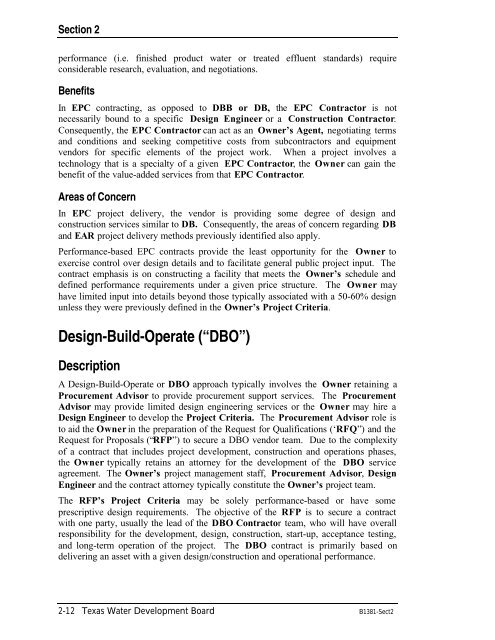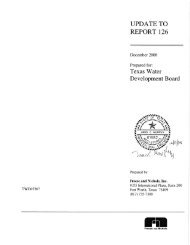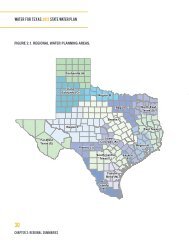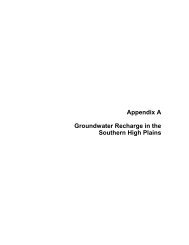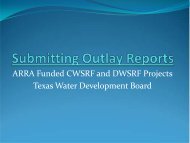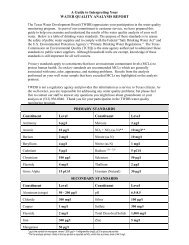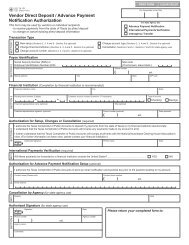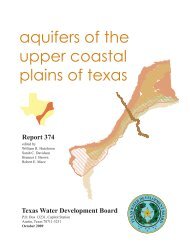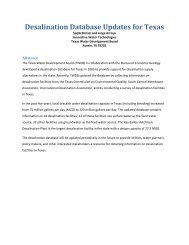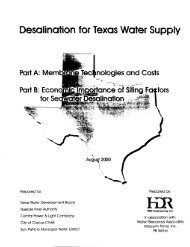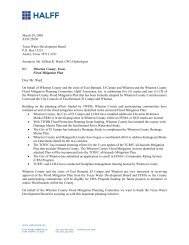Alternative Project Delivery - Texas Water Development Board
Alternative Project Delivery - Texas Water Development Board
Alternative Project Delivery - Texas Water Development Board
Create successful ePaper yourself
Turn your PDF publications into a flip-book with our unique Google optimized e-Paper software.
Section 2<br />
performance (i.e. finished product water or treated effluent standards) require<br />
considerable research, evaluation, and negotiations.<br />
Benefits<br />
In EPC contracting, as opposed to DBB or DB, the EPC Contractor is not<br />
necessarily bound to a specific Design Engineer or a Construction Contractor.<br />
Consequently, the EPC Contractor can act as an Owner’s Agent, negotiating terms<br />
and conditions and seeking competitive costs from subcontractors and equipment<br />
vendors for specific elements of the project work. When a project involves a<br />
technology that is a specialty of a given EPC Contractor, the Owner can gain the<br />
benefit of the value-added services from that EPC Contractor.<br />
Areas of Concern<br />
In EPC project delivery, the vendor is providing some degree of design and<br />
construction services similar to DB. Consequently, the areas of concern regarding DB<br />
and EAR project delivery methods previously identified also apply.<br />
Performance-based EPC contracts provide the least opportunity for the Owner to<br />
exercise control over design details and to facilitate general public project input. The<br />
contract emphasis is on constructing a facility that meets the Owner’s schedule and<br />
defined performance requirements under a given price structure. The Owner may<br />
have limited input into details beyond those typically associated with a 50-60% design<br />
unless they were previously defined in the Owner’s <strong>Project</strong> Criteria.<br />
Design-Build-Operate (“DBO”)<br />
Description<br />
A Design-Build-Operate or DBO approach typically involves the Owner retaining a<br />
Procurement Advisor to provide procurement support services. The Procurement<br />
Advisor may provide limited design engineering services or the Owner may hire a<br />
Design Engineer to develop the <strong>Project</strong> Criteria. The Procurement Advisor role is<br />
to aid the Owner in the preparation of the Request for Qualifications (‘RFQ”) and the<br />
Request for Proposals (“RFP”) to secure a DBO vendor team. Due to the complexity<br />
of a contract that includes project development, construction and operations phases,<br />
the Owner typically retains an attorney for the development of the DBO service<br />
agreement. The Owner’s project management staff, Procurement Advisor, Design<br />
Engineer and the contract attorney typically constitute the Owner’s project team.<br />
The RFP’s <strong>Project</strong> Criteria may be solely performance-based or have some<br />
prescriptive design requirements. The objective of the RFP is to secure a contract<br />
with one party, usually the lead of the DBO Contractor team, who will have overall<br />
responsibility for the development, design, construction, start-up, acceptance testing,<br />
and long-term operation of the project. The DBO contract is primarily based on<br />
delivering an asset with a given design/construction and operational performance.<br />
2-12 <strong>Texas</strong> <strong>Water</strong> <strong>Development</strong> <strong>Board</strong> B1381-Sect2


